Will Deferred Adjudication Show on a Background Check?
Could a background check reveal deferred adjudication? It depends on the state where the adjudication was issued, some states allow it, while others will not.
 Written by Background Check Repair
Written by Background Check Repair
Background Checks | May 8, 2024
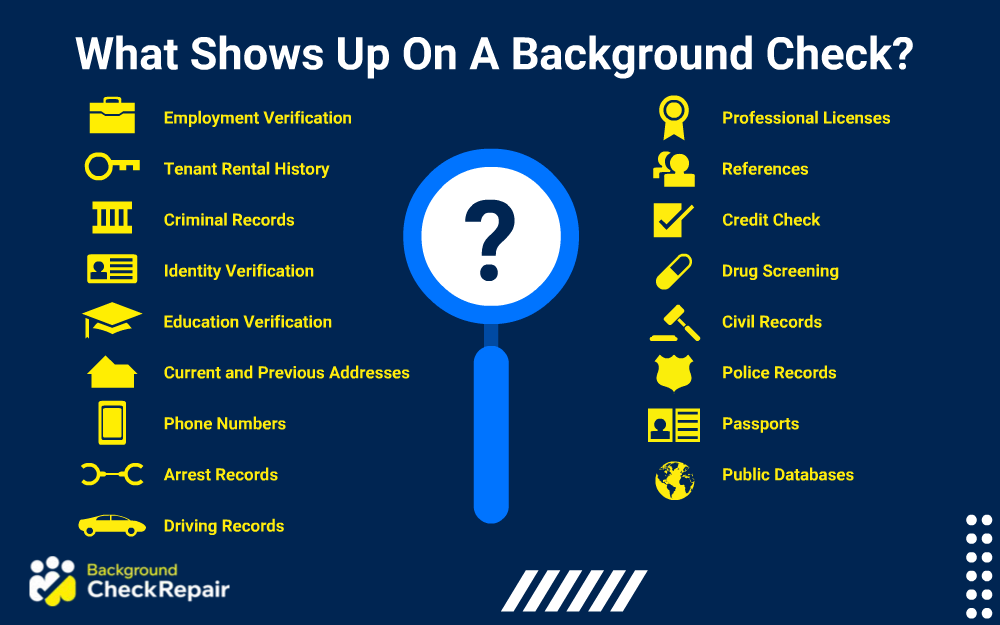
Table of Contents
What does a background check show? Background checks can reveal a lot of highly-sensitive info. For this reason, employers and job seekers need to know what all is included in the different types of background checks and how exactly that info can be used legally.
In this article, we will answer the most common questions we get about what appears on different background checks. This includes employment (employer) background checks, criminal background checks, level 2 background checks and fingerprint background checks.
A quick Google search online will show that background checks come in many different types and forms. Each background check type reveals a different level of personal and background information.
If you are a job candidate or an employer, it’s a good idea to know exactly what kind of information will be shown for each background check type…and more importantly how that information can be used.
Information that is uncovered from an employment background check is very personal and sensitive information. For this reason, they must comply with very strict privacy-protection laws and regulations.
Using a background check to make a hiring decision also must comply with the federal Fair Credit Reporting Act (FCRA) and Equal Employment Opportunity Commission (EEOC). Sharing this information may also be restricted by additional local and state requirements.
When running an employment background check, you need to make sure you are using an accredited agency that abides by the FCRA guidelines.2
On the other hand, if you are looking for a job, it’s important to background check yourself to see what is on your public records report.
What appears on a pre-employment background screening includes a handful of different records:
In addition to the information about, depending on the type of job and the nature of the work, employers may also:
To be clear, pre-employment drug screening is usually made mandatory for jobs that include operating motor vehicles and operating dangerous equipment, or revolve around providing safety for the public, other company employees, or customers.
With that said, local and state laws do limit a portion of what can be shown on an employment background check:
If a job candidate is applying for a job that makes less than $75,000 per year, some information will not show up in the background check results:
However, if the job is for a position that makes more than $75,000 per year,2 that information can appear in your records…even if it has been longer than seven years ago.
The phrasing “fingerprint background check” is actually a term used to describe a background check that uses a candidate’s fingerprint (and other personal info) to retrieve historical data.
The main reason for a fingerprint background check is that it provides a high level of certainty. In other words, you can be sure that the records are associated with the candidate in question.
The exact nature of fingerprint searches can vary and depends on what information the employer requests as well as what database is being used by the company performing the check.
In most cases, a fingerprint check relies on the FBI criminal records database. However, other “Automated Fingerprint Identification Systems” (AFIS) and databases may be used instead. Or in some cases, both will be used.
There is a difference, however, between an FBI background screening and a level 2 check though both require fingerprints. The former is required for public or governmental positions while the latter is required when investigating those who will be around vulnerable people such as children and the elderly.
Used often to screen a candidate for jobs within federal governmental agencies, government contractors, and companies working alongside federal agencies, an FBI background check can uncover any and all interactions a candidate might have had with law enforcement (as long as that info was provided to the federal FBI database system.
This can include convictions as well as arrests that did not end up with indictments or convictions. It can also include traffic and driving violations (even things like parking tickets).
Candidates must comply with fingerprinting by a verified law enforcement agency where their fingerprints will be reviewed against the FBI’s own Integrated Automated Fingerprint Identification System (IAFIS).
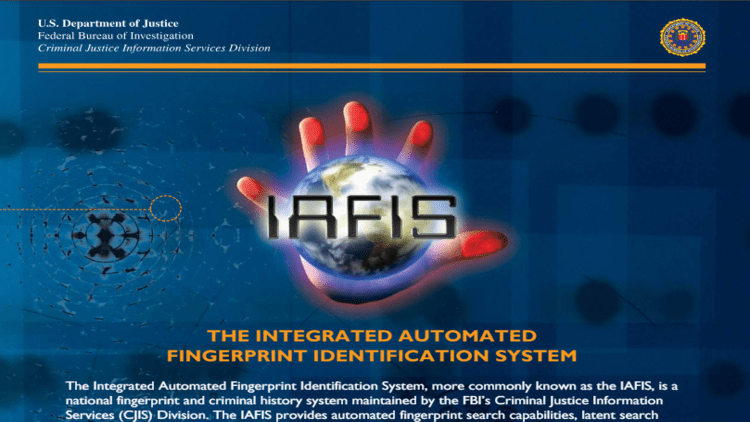
(Image: Federal Bureau of Investigation6)
The IAFIS is a large database of fingerprints submitted by law enforcement groups, immigration agencies, and employment screenings from the past. This data matches personal information to prints taken for both criminal and civil reasons.
Fingerprints will also be compared against the National Crime Information Center’s (NCIC) computer database. The NCIC is a massive collection of criminal histories including wanted criminals, sexual offenders, and even terrorists.
But FBI background checks have been under increased fire in recent years, because FBI databases are sometimes incomplete, and also because the records they have may harm minorities disproportionately during job applications.
To be clear, passing an FBI background check does not mean you obtain a security clearance. It may be one of the first steps in the process, but security clearances normally include significantly more in-depth checks such as interviews with people who are very close with the candidate.
Level 2 checks are a special type of fingerprint background checks. They are normally used for jobs where candidates may be working with people that are vulnerable, such as children and those with disabilities. But Level 2 background checks aren’t just required for job seekers; they are also required for volunteers at schools, nursing homes, and daycare centers. Foster parents are also often required to comply with a Level 2 check before adopting.

Level 2 background checks review applicants by searching databases with information about arrests and prison time related to violent crimes against vulnerable people.
It is important to note that these types of background checks can even release records sealed by court rulings, including juvenile arrests and detention time.
Another common use for a level 2 check is obtaining a US police clearance document.
Alternatively, a level 1 check may be used for a low-level or entry position that does not deal with sensitive information or vulnerable people such as children or the elderly.
A criminal background check can be used for a number of reasons, including checking someone’s personal public records for convictions when applying for a job, housing, adoption, or a number of other instances.
Knowing what shows up on a criminal background check can help, but the first step is to understand whether the check involves fingerprints or not. For example, seal records or civil cases are generally not included.
Can criminal records outside the state show up in background checks? The answer to this question is yes if the check involves fingerprints, or the person has a conviction that results in being placed on the National Sex Offender Registry.4
This registry is checked even during level 1 screenings and will show convictions from any state.
Whether or not a background check shows arrest records depends on a few factors. Each state has its own laws about whether arrests are allowed on background checks, and some states will remove them upon certain conditions.
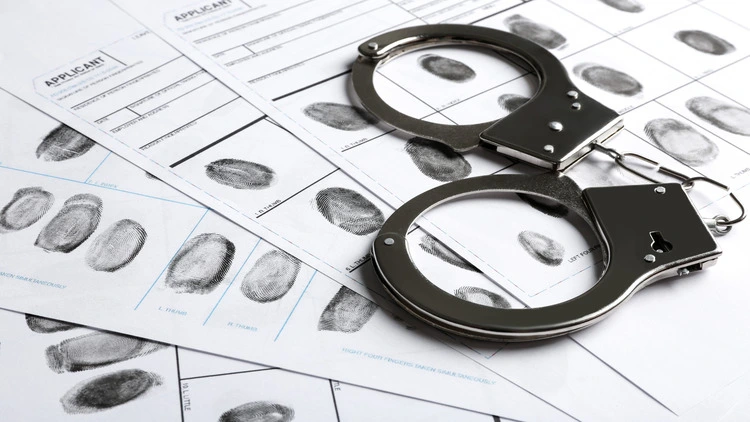
Knowing which states automatically remove arrests and arrests without conviction from the background check is an important factor to consider because when asking if a background check reveals dismissed charges, there are a few states that prohibit those from appearing, even on level 2 checks.
Again, state law plays a role on will a felony show up on a background check, but the key for most criminal records is how old they are.
Certain states prohibit employment and other types of background checks to examine criminal records that are older than seven years. Otherwise, states with a 10-year limit on background checks will allow certain jobs and screenings to look at records 10 years or older. It all depends on where the background check is being conducted.
The type of background check that is run (or not run) often depends on the type of employment you’re seeking. For example, many lower-level positions, such as restaurant or trade work do not conduct background checks on newly hired individuals.
However, when seeking a management position in these industries, a level 1 or level 2 background check will often be part of the hiring process.
Certain employment background checks are extensive and will reveal past employers, but most public records searches will not.
When credit checks are conducted, these can sometimes include an employer, but in most cases, the background check process requires a personal search to verify and reveal past employers. This is generally done using references.
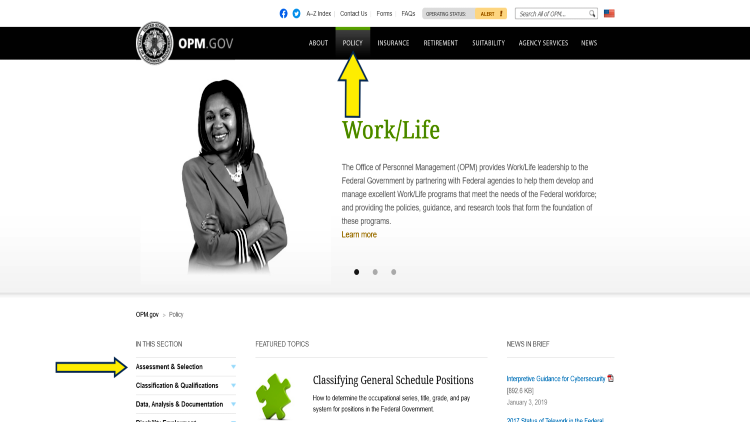
(Image: U.S. Office of Personnel Management5) The Office of Personnel Management helps organize the benefits and rules, as well as background checks, that are conducted for government and public-related positions of employment.
Many people wonder if a background screening will reveal a person’s OnlyFans history. This is a tricky question as well. If the check examines income and tax records, then an employer such as OnlyFans will show up.
Many background checks will show tax records, particularly those that are done for security clearances, corporate-level positions, or data specialists.
Credit history is also examined during adoption background checks and other positions of trust.
| Industry Background Check | What Shows Up? |
| Background Verification for Notaries | Criminal Records, Public Information |
| Real Estate Background Check | Criminal Records, Public Information |
| Validation of Professional License | Criminal Records, Public Information |
| Background Check for Non-Profits | Criminal Records, Public Information (State) |
| Background Check for Teachers | Criminal Records, Public Information (National) |
| Church Background Check | Criminal Records, Public Information (State) |
State laws often dictate what types of criminal records and court cases can be included in a background check.
Typically, the results that are returned also depend on the type of background check that was conducted. A fingerprint check will usually include more information because national criminal databases are examined.
The following table outlines some of the most commonly asked questions.
| Questions About What Shows Up on a Criminal Check | Answers |
| Does a background check reveal pending charges? | Basic, name-based checks will not usually show pending charges, but a fingerprint or law enforcement check can. |
| Are non-convicted arrests included in a background screening? | Depending on the state, arrests without conviction can show up on a background check. |
| Are police reports included in background check results? | Police reports resulting in arrests can show up on a background check. |
| Are warrants visible during background checks? | Civil warrants will generally not appear on a background check, but criminal ones can. |
| Can pending legal matters appear on background investigations? | Pending court cases that are connected to criminal arrests will often show up on a background check. |
| Does a background check turn up a probation warrant? | A probation violation that results in a warrant will show up on a background check. |
| Will a record of parole appear on criminal checks? | Parole can show up on a background check in connection with a criminal conviction, but is also subject to FCRA time frames. |
| Does a first-offense record show up on a background screening? | Yes, a first offense can show up on a background check unless the conviction is expunged. |
Driving records are part of many kinds of background checks. For example, sometimes a DUI can prevent entry into a country during a global background investigation, and many positions that involve delivery will naturally check someone’s motor vehicle reports (MVR evaluation).
The following questions are some of the most common among individuals applying for driving positions.
In general, a traffic violation (such as speeding) will not show up on a criminal background check.
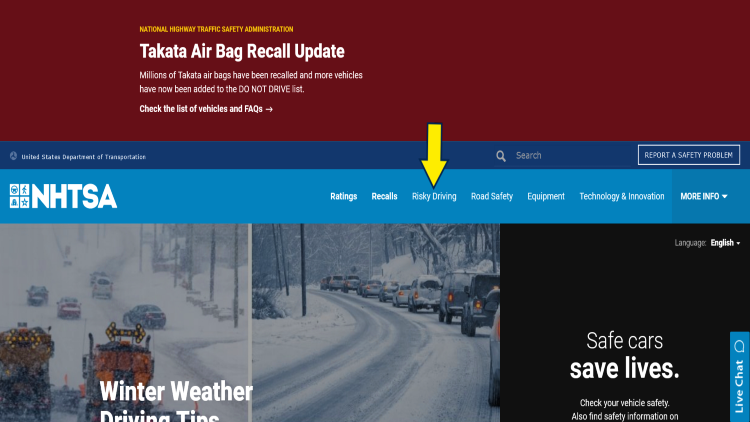
(Image: National Highway Traffic Safety Administration3) The National Highway and Traffic Safety Administration compiles statistics about hazardous conditions as well as risky driving, but MVR reports are kept at the state level.
However, if the violation ranks as a misdemeanor or felony, such as reckless driving, vehicular homicide, or driving under the influence of drugs (DUI) or alcohol, these types of charges can show up on a background check.
Since most states rank DUI charges as a misdemeanor (at the least), a DUI will often show up on a background check.
However, like all criminal records, the length of time that the records appear will be dictated by state legal statutes.
Does speeding ticket show up on a background check? Usually, they will not, unless the rate of speed has classified the charge as reckless driving.
It’s important to note that if you have multiple speeding tickets that accumulate enough points to have your driver’s license revoked, then that information can show up on an employment background check.
When asking whether infractions go on a background check or if a vehicular accident may appear in them, the answer depends on the type of background check being performed.
If the background check is being conducted for a delivery position or security clearance, then it is likely that these records will be visible on the screening. However, on most personal background checks, they won’t show up unless the check deliberately scans driving records.
| Company Background Checks | What Shows Up? |
| Walmart Background Screening | Criminal Records, Public Information (State) for some positions |
| Home Depot Background Screening | Criminal Records, Public Information (State) for some positions |
| Amazon Background Screening | Criminal Records, Public Information (State), Driving Records for some positions |
| UPS Background Screening | Criminal Records, Public Information (State), Driving Records for some positions. C-level can check national records, tax information |
| Uber Background Screening | Criminal Records, Public Information (State), Driving Records |
| Postmates Background Check | Criminal Records, Public Information (State), Driving Records |
| FedEx Background Screening | Criminal Records, Public Information (State), Driving Records |
| Grubhub Background Screening | Criminal Records, Public Information (State), Driving Records |
| DoorDash Background Screening | Criminal Records, Public Information (State), Driving Records |
| Lowes Background Screening | Criminal Records, Public Information (State), Driving Records |
| Starbucks Background Screening | Basic Level 1 Check, C-level positions may check national records |
| Lyft Background Screening | Criminal Records, Public Information (State), Driving Records |
| Daycare Background Screening | Criminal Records, Public Information (State and National), Driving Records |
| DOT Background Screening | Criminal Records, Public Information (State and National), Driving Records |
Do juvenile records show up on background checks? It depends. Most states prohibit juvenile records from public access and they are typically sealed.
However, state agencies and law enforcement personnel can access juvenile records during a background search that’s conducted after an arrest. Moreover, a juvenile record can impact a person’s ability to attain some types of government jobs and security clearances.
With military records, whether they show up on a civilian background check depends on the type of record and the type of screening. Many level 1 checks will not show military records unless the record involves a criminal conviction.
Do background checks reveal dishonorable military discharge? It can, if the dishonorable discharge was related to a criminal offense.
It is also likely that a military conviction will turn up on your records if the conviction isn’t older than 7-10 years.
A renter’s background check generally scans a person’s state criminal and public records, as well as credit and tax history information.
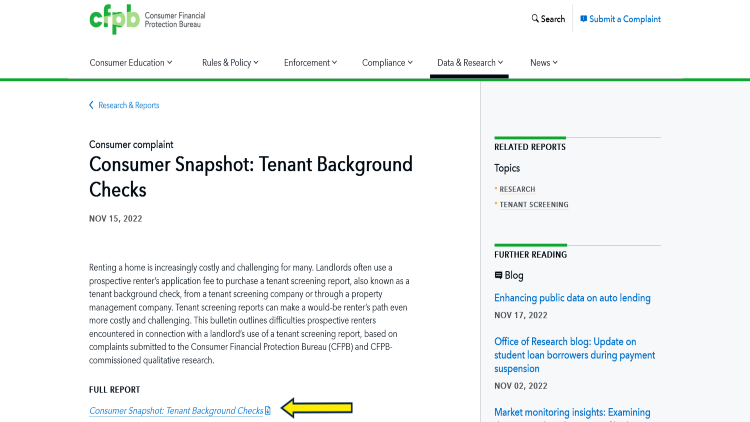
(Image: Consumer Financial Protection Bureau1) The Consumer Financial Protection Bureau helps people who have complaints against a landlord using a tenant background check. Users can file complaints and learn more about their rights on this free government website.
In addition, most tenant checks also examine national and state sex offender registries, which keep records for life.
An eviction will only show up on a background check if the case went to court and a judgement was issued for removal. Otherwise, as a civil charge, usually, these won’t show up.
It’s important to note, however, that if the previous landlord is listed on a rental application, that person may disclose a prior eviction process.
What your background check consists of will depend on many factors, including the type of info being requested and the kind of investigation being run. The best way to know is to run a background check on yourself.
Note: if you find anything incorrect with your report, you should rectify your background check results as soon as possible to avoid any negative consequences.
Could a background check reveal deferred adjudication? It depends on the state where the adjudication was issued, some states allow it, while others will not.
Probation can show up on a background check as part of the criminal record.
1CFPB Website screenshot. (2024). Consumer Financial Protection Bureau. Retrieved April 18, 2024, from <https://www.consumerfinance.gov>
2Federal Trade Commission. (2023, May). Fair Credit Reporting Act. Federal Trade Commission. Retrieved April 18, 2024, from <https://www.ftc.gov/system/files/ftc_gov/pdf/fcra-may2023-508.pdf>
3NHTSA Website screenshot. (2024). National Highway Traffic Safety Administration. Retrieved April 18, 2024, from <https://www.nhtsa.gov>
4National Sex Offender Registry. (2024). Search Public Sex Offender Registries. National Sex Offender Registry. Retrieved April 18, 2024, from <https://www.nsopw.gov/search-public-sex-offender-registries>
5OPM Website screenshot. (2024). U.S. Office of Personnel Management. Retrieved April 18, 2024, from <https://www.opm.gov>
6FBI. (2008). The Integrated Automated Fingerprint Identification System. U.S. Department of Justice, Federal Bureau of Investigation, Criminal Justice Information Services Division. Retrieved May 7, 2024 from <https://ucr.fbi.gov/fingerprints_biometrics/biometric-center-of-excellence/files/iafis_0808_one-pager825>
We use cookies to ensure that we give you the best experience on our website. If you continue to use this site we will assume that you are happy with it